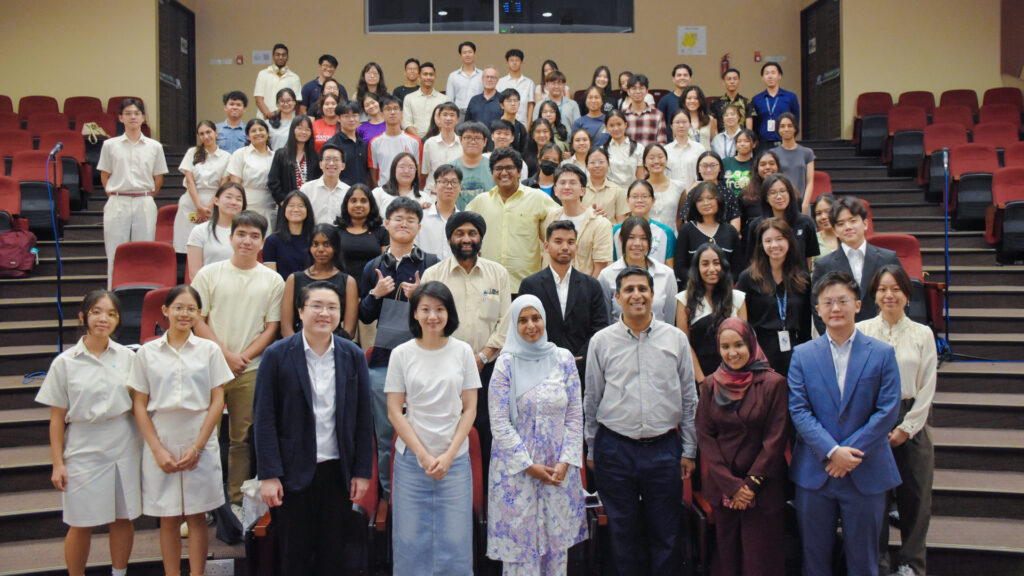Beyond the grades: What success means to a new generation
May 27, 2025

Traditionally, success in meritocratic Singapore has been closely tied to academic achievement, career advancement and wealth accumulation – think elite schools, top university degrees and high-paying jobs in coveted professional industries like finance and law. But is this definition too narrow? And should it be broadened to include other considerations to foster greater individual well-being and societal resilience?
These questions, which many young Singaporeans have been grappling with more openly in recent years, were central to discussions at the recent Insights Singapore Forum (ISF) themed “Redefining Success: Navigating One’s Youth”.
Organised by the NUS Political Science Society (PSSOC), this year’s Forum gathered prominent speakers including Ms Sun Xueling, Senior Minister of State for National Development and Transport, Associate Professor Razwana Begum from the Singapore University of Social Sciences and Nominated Member of Parliament, and Dr Mathew Mathews, Principal Research Fellow and Head of the IPS Social Lab at the Institute of Policy Studies (IPS), for a dialogue with secondary- and tertiary-level students.
Speakers at the Forum weighed in on the themes of meritocracy, the reality of inherited privilege, and how peer pressure and social media can influence conventional ideas of success. While they emphasised the pivotal role of society and employers in recognising and valuing individuals who pursue less traditional career paths, they also stressed the need for individuals to align their purpose with market realities and evolving technologies, particularly with the advent of the Fourth Industrial Revolution that is fuelled by advances in artificial intelligence.
The discussion also touched on the topic of elitism and whether such attitudes can be fully overcome. A key point of consideration for participants was whether the issue could also stem from an unintended and unfortunate consequence of meritocracy. Speakers pointed out that the belief in success as solely being the result of hard work can lead individuals to assume that those who have not done as well simply did not try hard enough.
Participants also discussed how meritocracy, while intended to reward individual effort and ability, can unintentionally entrench intergenerational privilege. This is because those who have benefitted from the system are better positioned to support their children not only in education, but also in access to resources, networks, and opportunities. While government interventions can address these imbalances, there was a call among speakers and participants for a broader societal shift – one that moves the focus beyond individual success toward a more inclusive and multi-dimensional understanding of success within society.
Another point raised during the discussion was whether having a narrow definition of success, based solely on academic and career achievement, could lead to negative outcomes such as narcissism, mental health issues, and a distorted sense of what success truly means. Instead of narrowly pursuing rigid definitions, a better definition of success could involve recognising each individual’s attributes and aspirations and celebrating achievements at different milestones, the speakers suggested.
Ultimately, more open conversations amongst policymakers, educators, parents and young people themselves would also be imperative to communicate and catalyse such a paradigm shift.
The dialogue was moderated by Mr Ng Chia Wee from the Department of Political Science at the NUS Faculty of Arts and Social Sciences (FASS). Noting that the idea of success is “never an easy topic to grapple with in our society”, Mr Ng said he appreciated the speakers’ candour at tackling the topic and expressed hope that participants will build on these insightful takeaways and “continue the conversation in their own ways”.
One participant, Hwa Chong Institution’s Ms Soh Jia Min, shared that it was interesting to hear different perspectives about how success in today’s society no longer follows just a few conventional paths, and how there are structural efforts being made to support more diverse definitions of success.
Ms Irdina Duran, President of PSSOC and a Year 2 FASS student said: “We hope that attendees would have gained a clearer understanding of what success truly means: the steps we, as a society, need to take to get there, and the importance of embracing this mindset shift. We also hope that students managed to make meaningful connections with one another, and we truly appreciate their support and enthusiastic participation.”
Formerly known as Ninety Percent, the ISF is an annual dialogue aimed at fostering vibrant academic discussions on Singapore’s past, present and future to enhance political awareness among today’s youth. Previous iterations of the Forum have witnessed the discussion of a host of engaging and topical issues, both local and international, such as the role of the People’s Action Party in Singapore or political liberalisation in China. Past panellists have included prominent academics, members of parliament as well as representatives from civil society and non-governmental organisations.

